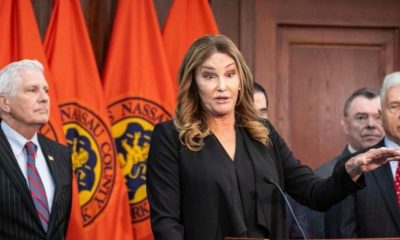National
Quinn: More work on LGBT issues needed in N.Y.
NYC Council speaker calls lack of trans protections ‘not acceptable’

HOUSTON — For lesbian New York City Council Speaker Christine Quinn, the passage of a same-sex marriage law in New York was a big win, but she acknowledges that more work on LGBT issues is needed.
“It passed in a pretty low time in our economy and a tough time for the city and state, and what I’ve noticed is wherever I go in the city — even still — people are happy,” Quinn told the Washington Blade. “You go to senior centers, they’re still congratulating me. It’s really created, I think, a lot of joy and a stronger sense of community in the city.”
Quinn made the remarks during the 27th International Gay & Lesbian Leadership Conference — sponsored by the Gay & Lesbian Leadership Institute — after a panel session titled “Victory in New York: A Model for Success,” in which participants discussed the strategy that led to the enactment of same-sex marriage in New York.
Despite that victory, one key piece of pro-LGBT state legislation that still hasn’t passed in New York is GENDA, or the Gender Employment Non-Discrimination Act, which would institute non-discrimination protections for transgender people in the private workforce.
Quinn noted that New York City has transgender protections, but called the lack of statutory protections at the state level “simply not acceptable.”
“So I think we can be simultaneously happy, proud of ourselves, but not satisfied because we have more work to do, and GENDA is top of that list,” Quinn said.
Quinn added she’s “optimistic” that transgender employment protections will pass “very soon” in the New York Legislature because Gov. Andrew Cuomo (D) — credited with leading the marriage fight in New York — supports the measure.
Other advancements Quinn is seeking on LGBT issues include a reduction in hate crimes, additional funding for LGBT organizations and effective implementation of the Dignity for All Schools Act, a law that bars bullying in schools, including on the basis of sexual orientation and gender identity.
Asked about President Obama’s lack of support for marriage equality, Quinn said she’s unhappy with anyone who doesn’t support marriage rights for gay couples, but commends those who say they could evolve on the issue — which Obama has done.
“I applaud people who are open to discussing, thinking and evolving, and the president is certainly in that category, but I want him to fully get there,” Quinn said.
Quinn, who’s expected to run for mayor of New York City in 2013, declined to say whether she would pursue the office.
Pressed further on the implications of having an openly lesbian mayor of the nation’s largest city, Quinn said an openly LGBT person winning elected office anywhere is a “step forward.”
“I think anytime somebody who’s openly LGBT gets elected to office — whatever office that is, whatever city, state, town that’s in — it is helpful to moving LGBT issues forward, and all civil and human rights issues forward,” Quinn said. “What city it is, what position it is doesn’t matter. Anytime it happens, it’s a step forward for everybody.”
A transcript of the interview with Quinn follows:
Washington Blade: You’ve had marriage equality in New York State for quite a few months now. How do you think that has changed New York City?
Christine Quinn: I think the thing that’s most fun about marriage equality passing is how happy it has made people. It passed in a pretty low time in our economy and a tough time for the city and state, and what I’ve noticed is wherever I go in the city — even still — people are happy. You go to senior centers, they’re still congratulating me. It’s really created, I think, a lot of joy and a stronger sense of community in the city.
Blade: Marriage equality is a big win, but statutory protections for transgender people in the workplace remains outstanding in the State of New York. Do you have any —
Quinn: Absolutely. Our work is not done. We have the GENDA in New York City; we don’t have it in New York State. And that’s simply not acceptable, so I think we can be simultaneously happy, proud of ourselves, but not satisfied because we have more work to do, and GENDA is top of that list.
Blade: I know you’re not in Albany, but are you able to make a prediction for when you think we will see those protections put in place?
Quinn: I’m optimistic that GENDA will be passed very soon. The governor, who is incredibly popular and incredibly effective, is supportive. He was one of the key differences in getting marriage, so I’m very optimistic it’ll be in the near future.
Blade: Are there any other LGBT issues you want to see addressed either at the state or city level?
Quinn: We have to find ways to reduce hate crimes against all people — particularly people who are perceived to be LGBT.
Our statewide advocacy group, the [Empire State] Pride Agenda, has done a lot of great work around funding for LGBT organizations. Our organizations are funded at a disproportionately low percentage compared to others. That health and human service work has to continue.
And we have a big “to-do” on our list, which is to get to the Dignity for All Schools Act implemented effectively over the next couple years. So that’s just a few.
Blade: What’s your take on the presidential race, and as a Democrat do you have a favorite candidate among the Republicans?
Quinn: My favorite candidate is President Obama. And he’s going to win re-election, and I think the Republicans make it clearer every day of the week that there is no one worth supporting on their side.
Blade: At the federal level, we’ve seen a lot of advances, but President Obama has yet to support marriage equality. Does that disappoint you?
Quinn: I’m disappointed in anybody who doesn’t agree with us in marriage equality. That said, I applaud people who are open to discussing, thinking and evolving, and the president is certainly in that category, but I want him to fully get there.
Blade: I’m sure a lot of people are asking you this, but I’m going to take a stab at it here. Are you going to run for mayor in 2013?
Quinn: There’s more time to talk about that, but thank you for asking me all the legislative questions.
Blade: One last question for you. Hypothetically speaking, what do you think would be the implications of having an openly lesbian mayor of the nation’s largest city?
Quinn: Look, I think anytime somebody who’s openly LGBT gets elected to office — whatever office that is, whatever city, state, town that’s in — it is helpful to moving LGBT issues forward, and all civil and human rights issues forward. What city it is, what position it is doesn’t matter. Anytime it happens, it’s a step forward for everybody.
Blade: Thank you so much, Madam Speaker.
Watch the video of the interview here:
State Department
State Department releases annual human rights report
Antony Blinken reiterates criticism of Uganda’s Anti-Homosexuality Act

Secretary of State Antony Blinken on Monday once again reiterated his criticism of Uganda’s Anti-Homosexuality Act upon release of the State Department’s annual human rights report.
“This year’s report also captures human rights abuses against members of vulnerable communities,” he told reporters. “In Afghanistan, the Taliban have limited work opportunities for women, shuttered institutions found educating girls, and increasing floggings for women and men accused of, quote, ‘immoral behavior,’ end quote. Uganda passed a draconian and discriminatory Anti-Homosexuality Act, threatening LGBTQI+ individuals with life imprisonment, even death, simply for being with the person they loved.”
Ugandan President Yoweri Museveni last May signed the law, which contains a death penalty provision for “aggravated homosexuality.”
The U.S. subsequently imposed visa restrictions on Ugandan officials and removed the country from a program that allows sub-Saharan African countries to trade duty-free with the U.S. The World Bank Group also announced the suspension of new loans to Uganda.
Uganda’s Constitutional Court earlier this month refused to “nullify the Anti-Homosexuality Act in its totality.” More than a dozen Ugandan LGBTQ activists have appealed the ruling.
Clare Byarugaba of Chapter Four Uganda, a Ugandan LGBTQ rights group, on Monday met with National Security Council Chief-of-Staff Curtis Ried. Jay Gilliam, the senior LGBTQI+ coordinator for the U.S. Agency for International Development, in February traveled to Uganda and met with LGBTQ activists who discussed the Anti-Homosexuality Act’s impact.
“LGBTQI+ activists reported police arrested numerous individuals on the basis of their sexual orientation or gender identity and subjected many to forced anal exams, a medically discredited practice with no evidentiary value that was considered a form of cruel, inhuman, and degrading treatment and could amount to torture,” reads the human rights report.
The report, among other things, also notes Ugandan human rights activists “reported numerous instances of state and non-state actor violence and harassment against LGBTQI+ persons and noted authorities did not adequately investigate the cases.”
Report highlights anti-LGBTQ crackdowns in Ghana, Hungary, Russia
Ghanaian lawmakers on Feb. 28 approved the Promotion of Proper Human Sexual Rights and Ghanaian Family Values Bill. The country’s president, Nana Akufo-Addo, has said he will not sign the measure until the Ghanaian Supreme Court rules on whether it is constitutional or not.
The human rights report notes “laws criminalizing consensual same-sex sexual conduct between adults” and “crimes involving violence or threats of violence targeting lesbian, gay, bisexual, transgender, queer or intersex persons” are among the “significant human rights issues” in Ghana.
The report documents Hungarian Prime Minister Viktor Orbán and members of his right-wing Fidesz party’s continued rhetoric against “gender ideology.” It also notes Russia’s ongoing crackdown against LGBTQ people that includes reports of “state actors committed violence against LGBTQI+ individuals based on their sexual orientation or gender identity, particularly in Chechnya.”
The report specifically notes Russian President Vladimir Putin on July 24 signed a law that bans “legal gender recognition, medical interventions aimed at changing the sex of a person, and gender-affirming care.” It also points out Papua New Guinea is among the countries in which consensual same-sex sexual relations remain criminalized.

The Cook Islands and Mauritius in decriminalized homosexuality in 2023.
The report notes the Namibia Supreme Court last May ruled the country must recognize same-sex marriages legally performed outside the country. The report also highlights the Indian Supreme Court’s ruling against marriage equality that it issued last October. (It later announced it would consider an appeal of the decision.)
Congress requires the State Department to release a human rights report each year.
The Biden-Harris administration in 2021 released a memorandum that committed the U.S. to promoting LGBTQ+ and intersex rights abroad.
The full report can be read here.
National
Same-sex couples vulnerable to adverse effects of climate change
Williams Institute report based on Census, federal agencies

A new report by the Williams Institute at the UCLA School of Law finds that same-sex couples are at greater risk of experiencing the adverse effects of climate change compared to different-sex couples.
LGBTQ people in same-sex couple households disproportionately live in coastal areas and cities and areas with poorer infrastructure and less access to resources, making them more vulnerable to climate hazards.
Using U.S. Census data and climate risk assessment data from NASA and the Federal Emergency Management Agency, researchers conducted a geographic analysis to assess the climate risk impacting same-sex couples. NASA’s risk assessment focuses on changes to meteorological patterns, infrastructure and built environment, and the presence of at-risk populations. FEMA’s assessment focuses on changes in the occurrence of severe weather events, accounting for at-risk populations, the availability of services, and access to resources.
Results show counties with a higher proportion of same-sex couples are, on average, at increased risk from environmental, infrastructure, and social vulnerabilities due to climate change.
“Given the disparate impact of climate change on LGBTQ populations, climate change policies, including disaster preparedness, response, and recovery plans, must address the specific needs and vulnerabilities facing LGBTQ people,” said study co-author Ari Shaw, senior fellow and director of international programs at the Williams Institute. “Policies should focus on mitigating discriminatory housing and urban development practices, making shelters safe spaces for LGBT people, and ensuring that relief aid reaches displaced LGBTQ individuals and families.”
“Factors underlying the geographic vulnerability are crucial to understanding why same-sex couples are threatened by climate change and whether the findings in our study apply to the broader LGBTQ population,” said study co-author Lindsay Mahowald, research data analyst at the Williams Institute. “More research is needed to examine how disparities in housing, employment, and health care among LGBT people compound the geographic vulnerabilities to climate change.”
Read the report
Federal Government
Lambda Legal praises Biden-Harris administration’s finalized Title IX regulations
New rules to take effect Aug. 1

The Biden-Harris administration’s revised Title IX policy “protects LGBTQ+ students from discrimination and other abuse,” Lambda Legal said in a statement praising the U.S. Department of Education’s issuance of the final rule on Friday.
Slated to take effect on Aug. 1, the new regulations constitute an expansion of the 1972 Title IX civil rights law, which prohibits sex-based discrimination in education programs that receive federal funding.
Pursuant to the U.S. Supreme Court’s ruling in the landmark 2020 Bostock v. Clayton County case, the department’s revised policy clarifies that discrimination on the basis of sexual orientation and gender identity constitutes sex-based discrimination as defined under the law.
“These regulations make it crystal clear that everyone can access schools that are safe, welcoming and that respect their rights,” Education Secretary Miguel Cardona said during a call with reporters on Thursday.
While the new rule does not provide guidance on whether schools must allow transgender students to play on sports teams corresponding with their gender identity to comply with Title IX, the question is addressed in a separate rule proposed by the agency in April.
The administration’s new policy also reverses some Trump-era Title IX rules governing how schools must respond to reports of sexual harassment and sexual assault, which were widely seen as imbalanced in favor of the accused.
Jennifer Klein, the director of the White House Gender Policy Council, said during Thursday’s call that the department sought to strike a balance with respect to these issues, “reaffirming our longstanding commitment to fundamental fairness.”
“We applaud the Biden administration’s action to rescind the legally unsound, cruel, and dangerous sexual harassment and assault rule of the previous administration,” Lambda Legal Nonbinary and Transgender Rights Project Director Sasha Buchert said in the group’s statement on Friday.
“Today’s rule instead appropriately underscores that Title IX’s civil rights protections clearly cover LGBTQ+ students, as well as survivors and pregnant and parenting students across race and gender identity,” she said. “Schools must be places where students can learn and thrive free of harassment, discrimination, and other abuse.”
-

 South America4 days ago
South America4 days agoDaniel Zamudio murderer’s parole request denied
-

 Maryland4 days ago
Maryland4 days agoMontgomery County police chief discusses arrest of trans student charged with planned school shooting
-

 Commentary5 days ago
Commentary5 days agoWorld ‘isn’t much different today’
-

 Theater4 days ago
Theater4 days ago‘Amm(i)gone’ explores family, queerness, and faith












